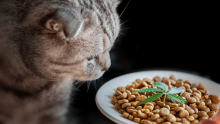By Nicole Abrego, checked by Dr. Michele Drake
Since the legalization of CBD (or cannabidiol) use in various states across the country, there has been an explosion of products derived from CBD entering the market. Additionally, this has also resulted in an influx of CBD based products that are marketed for pets. These products promise to help alleviate the symptoms of a variety of health issues ranging from osteoarthritis to epilepsy - but how effective and safe are these products? Should you be concerned about giving them to your pet? The Drake Center takes a closer look at CBD pet products and what you should know.
CBD? THC? What Are These and How Are They Different?
CBD, or cannabidiol, is a compound found in cannabis and hemp. CBD does not contain delta-9-tetrahydrocannabinol (THC), which is the compound found in marijuana. Most products that contain CBD are derived from hemp and not marijuana. “The primary difference between the two is that THC causes psychotropic effects (produces a ‘high’) and has a moderate level of toxicity while CBD is non-psychotropic and is felt by many investigators to be non-toxic or have limited toxicity.”
What Kind of Pet CBD Products Are Out There?
CBD products for pets come in a wide range of options such as CBD infused treats and chews, topical ointments, and the ever popular CBD oil extract and tinctures. These products advertise that they can help alleviate the symptoms of a variety of health issues ranging from osteoarthritis, anxiety, and epilepsy. These products have also been used for pain management or helping pets with mobility issues.

But Buyer Beware!
It’s important to note that the majority of these products are NOT approved or regulated by the FDA and in fact, a lot of the products often don’t contain the ingredients they list on the label.
Additionally, there are currently very few clinical studies and trials on CBD products and little evidence to support their effectiveness/ineffectiveness or long-term effects (if any) they can have on the pet.
In short, without proper testing and regulation, veterinarians are not able to safely recommend these CBD pet products let alone recommend a proper dosage for these products as there is very little information available. If you do decide to use a CBD product on your pet, please let your veterinarian know as it’s important for them to know all supplements or medications you give your pet.

Signs of THC Toxicity
With the legalization of marijuana products, we have seen a substantial increase of cases of THC intoxication in pets. This usually is from pets getting into their owner’s marijuana products such as the edibles or the marijuana plant itself. It’s of utmost importance to keep all THC products away from pets and out of easy-to-reach places.
If a pet ingests a THC product, it can be a very distressing and dangerous experience for them.
Common symptoms of THC toxicity are:
- Sedation/Lethargy
- Vocalization, whining or crying
- Dilated pupils or glassed over eyes
- Incoordination or trouble walking
- Vomiting
- Low blood pressure
- Low body temperature
- Seizures
- Coma (in extreme cases)
Additionally, edibles can become especially dangerous when they contain ingredients such as chocolate or the artificial sweetener, Xylitol, which are both extremely toxic to pets.
If you suspect that your pet may have ingested any type of product containing THC, please contact us immediately. It would be most helpful if you take note of how much of the product your pet may have ingested. Being upfront and honest about what your pet may have ingested is the best way to help us determine how best to effectively treat your pet.
If you have any questions or need to schedule an appointment, please feel free to reach out to us.
The Drake Center for Veterinary Care is an AAHA-accredited animal hospital located in Encinitas, CA. The Drake Center loves being a source of information for all pet owners across the country however if you have any questions regarding pet care and do not live in Encinitas, CA or surrounding cities, we encourage you to contact your local veterinarian.

